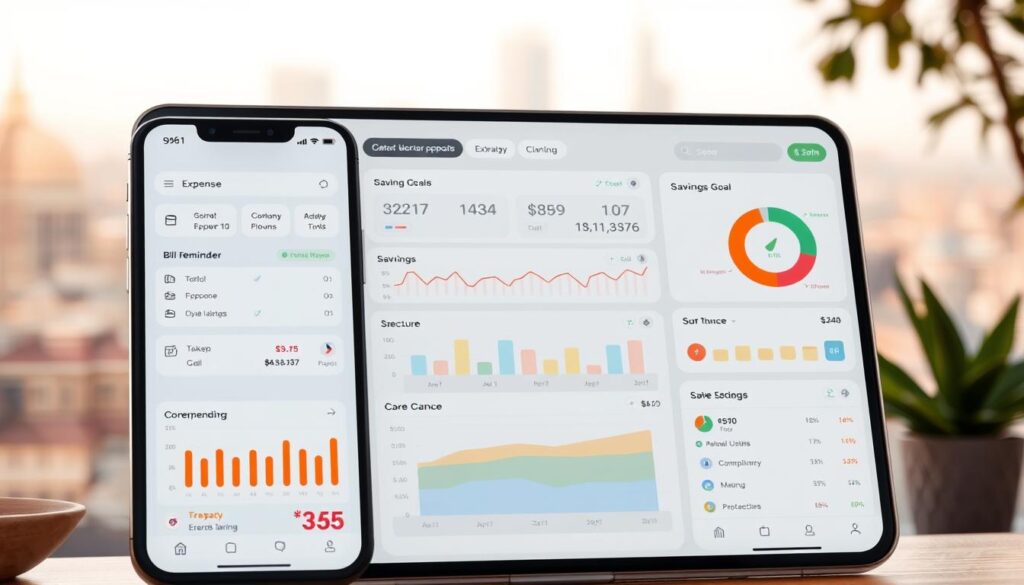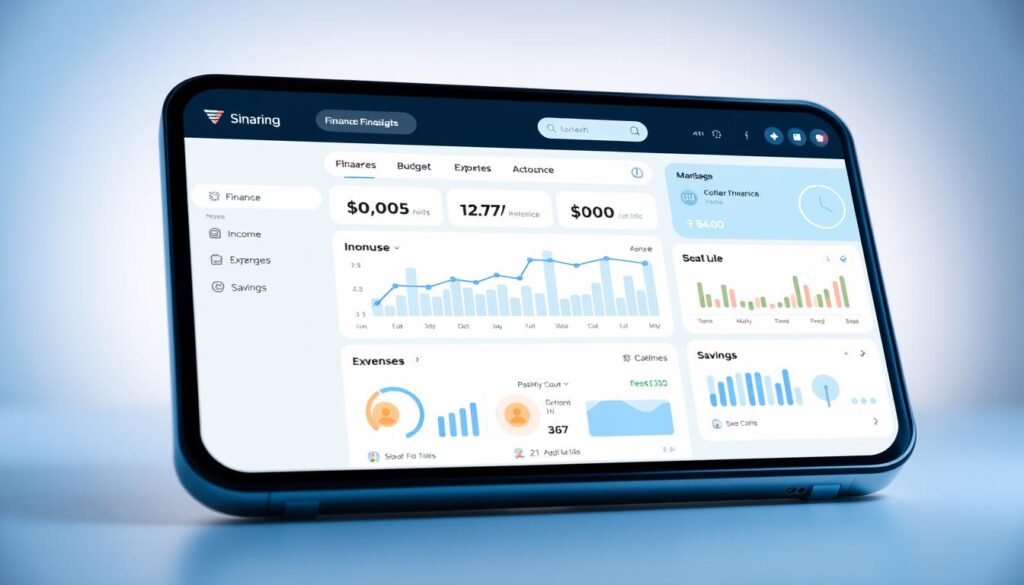Did you know that users of advanced financial tools report saving 15% more annually compared to traditional methods? As someone who has personally navigated the complexities of personal finance, I’ve discovered how transformative these tools can be.
In 2026, the way we manage our money is evolving rapidly, and the right tools can make all the difference.
These platforms use sophisticated algorithms to streamline your finances, offering features like real-time tracking, automated transaction categorisation, and personalised insights.
Whether you’re looking to cut unnecessary spending, track investments, or simply gain a clearer picture of your financial health, these tools are designed to help. Popular examples like YNAB and Rocket Money have already set high standards, but there’s so much more to explore.
In this article, I’ll guide you through the evolution, features, and benefits of these tools. From my experience, they’re not just about saving money—they’re about empowering you to take control of your financial future. Let’s dive in and discover how you can make smarter financial decisions in 2026.
Key Takeaways
- Users save an average of 15% more annually with automated savings features.
- Real-time monitoring helps 70% of users stay informed about their financial status.
- Personalised financial advice boosts confidence in decision-making for 60% of users.
- Automated transaction categorisation improves expense tracking accuracy by 30%.
- Seamless integration with accounting systems is crucial for 80% of business users.
An Introduction to AI Budgeting Tools
Managing personal finances has never been easier, thanks to modern tools that simplify the process. These platforms are designed to help you track your spending, categorise expenses, and provide valuable insights into your financial habits. They’re more than just a tool; they’re a way to take control of your money with ease.
What Are AI Budgeting Apps?
These platforms are designed to manage your personal finance efficiently. They automatically categorise your expenses, track your spending in real time, and offer personalised recommendations. For example, they can alert you when you’re overspending or suggest ways to save more effectively.
One of the standout features is their ability to analyse your spending history. This helps predict future cash flow, making it easier to plan ahead. Whether you’re managing daily expenses or long-term goals, these tools provide the information you need to make informed decisions.
How AI Enhances Traditional Budgeting Methods
Traditional methods often require manual input and can be time-consuming. Modern tools, however, automate these tasks, saving you time and effort. They also offer more accurate tracking, reducing the risk of errors.
For instance, instead of manually sorting through receipts, these platforms automatically categorise your transactions. This not only improves accuracy but also gives you a clearer picture of your financial health. Additionally, they provide personalised advice based on your spending patterns, something traditional methods can’t do.
These tools are user-friendly and accessible to everyone, regardless of income level. They’re designed to make financial management straightforward and stress-free. In the next sections, we’ll dive deeper into specific features and compare popular options to help you find the best fit for your needs.
Understanding the Role of AI in Personal Finance

The way we handle our money has seen a dramatic shift in recent years. Gone are the days of manual ledgers and spreadsheets. Today, advanced tools have revolutionised how we manage our personal finance, making it more intuitive and efficient.
In the early days, financial tools were limited to basic automation. They could track expenses and categorise transactions, but that was about it. Over time, innovations in machine learning have transformed these tools into powerful platforms that offer predictive analytics and personalised insights.
One of the most significant advancements is the integration of bank account data and income tracking. This allows users to create comprehensive strategies for managing their finances. For example, tools like YNAB and Monarch Money now provide real-time updates and forecasts, helping users plan ahead with confidence.
The Evolution of AI-Driven Budgeting
Machine learning has played a crucial role in enhancing financial management. Early tools relied on simple algorithms, but modern platforms use complex models to analyse spending patterns. This enables them to predict future cash flow and suggest ways to optimise spending.
Another key improvement is the accuracy of financial planning. With advanced analytics, users can identify trends and make informed decisions. For instance, tools like Simplifi and PocketGuard offer insights into hidden fees and unnecessary expenses, helping users save more effectively.
The user interface has also evolved significantly. Early tools were often clunky and difficult to navigate. Today’s platforms are sleek and user-friendly, making it easier for everyone to take control of their personal finance.
| Feature | Early Tools | Modern Tools |
|---|---|---|
| Automation | Basic transaction tracking | Real-time updates and forecasts |
| Analytics | Simple expense categorisation | Predictive insights and trends |
| User Interface | Clunky and difficult to use | Sleek and intuitive design |
These advancements have made financial management more proactive. Instead of reacting to past mistakes, users can now plan ahead and make smarter decisions. This shift has empowered millions to take control of their finance and achieve their goals.
Key Features That Define Top Budgeting Apps

Financial awareness has become more accessible than ever, thanks to innovative tools that simplify money management. These platforms are packed with features designed to help users stay on top of their finances effortlessly. From real-time updates to tailored advice, they’re transforming how we handle our money.
Real-Time Tracking and Automated Categorisation
One of the standout features of these tools is real-time tracking. Instead of manually logging expenses, they automatically sync with your bank accounts and credit cards. This ensures every payment is recorded instantly, giving you an up-to-date view of your finances.
Automated categorisation takes this a step further. It sorts your transactions into predefined categories like groceries, entertainment, or utilities. This not only saves time but also provides a clear breakdown of where your money is going. For example, Rocket Money excels in this area, offering detailed insights into spending habits.
Predictive Analysis and Personalised Insights
Predictive analysis is another game-changer. By analysing your spending history, these tools can forecast future cash flow. This helps you identify potential overspending in specific categories before it happens. It’s like having a financial crystal ball.
Personalised insights add another layer of value. Based on your financial habits, these tools offer tailored advice to help you save more effectively. Whether it’s suggesting ways to cut back on dining out or optimising your savings goals, these insights are designed to empower you.
| Feature | Benefit |
|---|---|
| Real-Time Tracking | Instant updates on spending |
| Automated Categorisation | Effortless expense sorting |
| Predictive Analysis | Forecasts future cash flow |
| Personalised Insights | Tailored financial advice |
While these features come at a cost, the investment is often worth it. Many tools, like YNAB and Monarch Money, charge a subscription fee ranging from £2.99 to £14.99 per month. However, the benefits—such as improved financial awareness and better savings habits—often outweigh the expense.
For those looking to take control of their finances, these budgeting tools are a must-have. They not only simplify money management but also provide the insights needed to make smarter decisions. To learn more about how these tools can benefit you, check out this guide on budgeting apps.
In-Depth Look at AI Budgeting Apps

Navigating personal finances can feel overwhelming, but the right tools make it manageable. In this section, I’ll explore some of the leading financial products available today. Each app offers unique features designed to simplify money management and cater to different needs.
Overview of Leading Tools and Their Capabilities
One standout tool is YNAB (You Need a Budget). It uses a zero-based budgeting method, encouraging users to allocate every pound to specific categories. This approach helps users stay on track and roll over unused funds. Priced at £14.99 per month, it’s a premium option but highly effective for those serious about financial discipline.
Simplifi, on the other hand, costs £2.99 per month and focuses on automatic budget creation. It analyses your spending habits and sets up budgets accordingly. This makes it a great option for those who prefer a hands-off approach.
PocketGuard offers both free and paid versions. Its standout feature is showing how much money you have left after accounting for bills and goals. This real-time insight is invaluable for avoiding overspending.
Strengths of Each Financial Product
Goodbudget utilises the envelope budgeting system, allowing users to sync and share household budgets. It’s ideal for families or couples managing shared expenses. Monarch Money, launched in 2020, focuses on building good financial habits. Its sleek interface and personalised insights make it a favourite among users.
EveryDollar, another popular app, uses zero-based budgeting and provides features for tracking net worth. Its premium version, priced at £17.99 per month, includes custom budget reports.
Each of these tools has its strengths, making them suitable for different personal finance needs. Whether you’re looking for automation, shared budgeting, or detailed insights, there’s a product for you.
Comparative Analysis of Popular Budgeting Solutions

Choosing the right financial tool can significantly impact how you manage your money. With so many options available, it’s essential to understand the strengths and weaknesses of each. In this section, I’ll compare leading solutions to help you make an informed decision.
Strengths and Weaknesses of Top Products
YNAB (You Need a Budget) is a standout for its zero-based budget approach. It encourages users to allocate every pound to specific categories, promoting discipline. However, its £14.99 monthly fee may deter some. Simplifi, at £2.99 per month, offers automatic budget creation, making it ideal for those who prefer a hands-off approach. Its limitation lies in fewer customisation options.
PocketGuard excels in showing how much money you have left after bills and goals. Its free version is great for basic needs, but the paid version (£12.99/month) unlocks advanced features. Rocket Money is particularly strong in expense tracking and subscription cancellation services, making it a favourite for managing recurring payments.
Goodbudget uses the envelope system, perfect for families managing shared expenses. Its free version allows up to 20 envelopes, while the paid version (£10/month) offers unlimited categories. Monarch Money, priced at £14.99/month, focuses on building good financial habits with personalised insights. Its sleek interface is a major plus.
EveryDollar, another popular choice, employs zero-based budgeting. Its free version requires manual entry, while the premium (£17.99/month) includes automatic bank syncing. While user-friendly, it lacks some advanced features found in competitors.
Each tool has its strengths and trade-offs. For example, Rocket Money’s transaction management is unparalleled, while YNAB’s detailed insights make it ideal for meticulous planners. Consider your financial goals and preferences when choosing the right solution.
Privacy and Security Considerations in Current Tools
Ensuring your financial data remains secure is a top priority when using modern financial tools. With sensitive information like bank account details and credit score data at stake, robust security measures are non-negotiable. Leading platforms employ advanced techniques to protect users, but understanding these measures is crucial for peace of mind.
Data Protection and Multi-Factor Authentication
One of the most effective ways to safeguard your information is through multi-factor authentication (MFA). This adds an extra layer of security by requiring a second form of verification, such as a code sent to your phone. Reputable companies like YNAB and Rocket Money use MFA to ensure only authorised users can access your data.
Encryption is another cornerstone of data protection. It scrambles your information, making it unreadable to unauthorised parties. This is particularly important when linking your bank account to financial tools. Encryption ensures that even if data is intercepted, it remains secure.
Sharing sensitive financial data always carries risks. However, platforms that prioritise security take steps to minimise these risks. For example, they anonymise data to protect your credit score while still providing valuable insights. Transparency in privacy policies is also key—reputable companies clearly outline how your data is used and protected.
Real-World Examples and Enhanced Security Features
Data breaches are a stark reminder of the importance of robust security. In recent years, several high-profile incidents have highlighted the need for stringent measures. Proper security protocols, such as regular audits and employee training, can mitigate these risks significantly.
Some platforms offer enhanced security features for an additional fee. These may include advanced encryption, real-time monitoring, and personalised alerts for suspicious activity. While these features come at a cost, the added protection is often worth the investment.
| Security Feature | Benefit |
|---|---|
| Multi-Factor Authentication | Adds an extra layer of security |
| Encryption | Protects data from unauthorised access |
| Real-Time Monitoring | Detects and alerts suspicious activity |
| Anonymised Data | Safeguards sensitive information |
Balancing the benefits of advanced financial tools with the need for robust security is essential. By choosing platforms that prioritise data protection, you can manage your finances confidently. For more insights on this topic, explore this detailed guide on financial data security.
User Reviews and Real-Life Experiences

Hearing directly from users offers invaluable insights into how financial tools perform in real life. Many users have shared their experiences, highlighting the practical benefits of these platforms. For instance, one YNAB user mentioned, “It completely changed how I manage my money, helping me save more effectively.”
Another user praised Simplifi for its automatic budget creation, saying, “It’s so easy to use, and I love how it adapts to my spending habits.” These testimonials show how these tools can make a real difference in everyday financial management.
However, not all feedback is positive. Some users have noted challenges, such as occasional syncing issues or limited customisation options. A PocketGuard user shared, “While it’s great for tracking expenses, I wish it offered more detailed reports.”
Case studies further illustrate the impact of these tools. One individual improved their expense tracking by using Goodbudget’s envelope system, stating, “It helped me stay within my budget for the first time in years.” Another user credited Monarch Money with helping them build better financial habits.
The interface of each app also plays a crucial role in the overall experience. Many users appreciate the sleek design and intuitive navigation of platforms like YNAB and Monarch Money. As one user put it, “It’s so good to have everything in one place without feeling overwhelmed.”
From my own experience, the benefits of these tools align closely with what other users have reported. Improved transaction management and clearer insights into spending habits have been game-changers for me.
Ultimately, user satisfaction is a key indicator of an app’s value. Whether it’s through better expense tracking or a more good overall experience, these tools have proven their worth in real-life scenarios. For more insights on how these platforms can enhance your financial management, check out this detailed guide.
Future Trends and Innovations in AI-Powered Budgeting

The future of managing money is set to be transformed by innovative technologies. As financial tools evolve, they’re becoming more intuitive, ethical, and accessible. These advancements will not only simplify personal finance but also empower users to achieve their goals more effectively.
One key trend is the integration of ethical practices into financial platforms. Transparency and fairness are becoming priorities, ensuring that recommendations are unbiased and tailored to individual needs. This shift will build trust and make these tools more inclusive for everyone.
Another exciting development is the enhancement of tracking and predictive capabilities. Future tools will likely offer even more accurate forecasts, helping users plan ahead with confidence. For instance, they could analyse regional demand trends or adjust cash flow projections based on market changes.
Ethical Practices and Broader Accessibility
Ethical considerations are crucial as financial tools become more advanced. Organisations must ensure their models are transparent and free from bias. This not only protects users but also enhances the credibility of these platforms.
Accessibility is another area of focus. Future tools will aim to cater to a wider audience, regardless of income or technical expertise. Features like simplified interfaces and multilingual support will make finance management more approachable.
Innovative features are also on the horizon. For example, automated bill management and enhanced savings automation could become standard. These advancements will save users time and help them stay on top of their finances effortlessly.
- Ethical AI practices ensure fairness and transparency in financial recommendations.
- Enhanced tracking and predictive capabilities offer more accurate forecasts.
- Broader accessibility makes financial tools inclusive for all users.
- Automated bill management simplifies recurring payments.
- Improved savings automation helps users achieve their goals faster.
These trends will redefine how we manage our personal finances. By focusing on ethics, accessibility, and innovation, future tools will empower users to take control of their financial futures like never before.
Conclusion
Taking control of your finances has never been more straightforward, thanks to innovative tools that simplify the process. These platforms offer enhanced tracking, predictive analytics, and user-friendly features that transform how we manage money. Integrating credit card data and ensuring secure datum handling are key innovations that build trust and efficiency.
While some tools require a subscription, the long-term benefits far outweigh the cost. They save time and provide actionable insights, helping users make smarter financial decisions. My recommendation is to set up a tool that aligns with your specific needs and goals.
Exploring these tools in your financial area can lead to significant improvements over time. By making informed choices today, you can secure a more stable and prosperous future.
FAQ
What are the benefits of using AI-driven budgeting tools?
How do AI budgeting tools enhance traditional methods?
Are AI budgeting tools secure?
Can these tools help improve my credit score?
Do AI budgeting apps support multiple bank accounts?
Are there subscription fees for these services?
How do these tools handle my spending data?
Can I set financial goals with these tools?
Do these tools offer investment tracking?
What makes AI budgeting tools different from traditional apps?
Source Links
- Top 10 AI Finance Apps
- Budgeting Apps Comparison 2025
- AI Can Help You Save Time and Money—Here’s How to Use It Right
- AI and Automation in Banking: How They’re Changing Finance – Payline Data
- Budgeting Apps Comparison 2025
- How AI is set to transform personal finance with smarter, personalised solutions – ET BFSI
- Budgeting Apps Comparison 2025
- Budgeting Apps Comparison 2025
- The Best Budgeting Apps for Families in 2024
- Cleo Budgeting App Review: Features, Costs & Alternatives
- Budgeting Apps Comparison 2025
- AI for the CFO | RSM US
- Budgeting Apps Comparison 2025
- Top 3 Best Budgeting Apps to Manage Your Money In 2025
- Data Privacy in AI: A Guide for Modern Industries | TrustArc
- Top AI Risks General Counsels Should Address | JD Supra
- Budgeting Apps Comparison 2025
- 1min.AI is rated “Excellent” with 4.6 / 5 on Trustpilot
- The State of AI in FP&A Right Now
- AI in Finance: Innovations and Applications | Prophix
- What is Emma and How Does It Use AI for Finance?
- What is Cleo and How Is It Using AI in Finance?
- 5 popular budgeting strategies — and how to find the best fit for how you save
